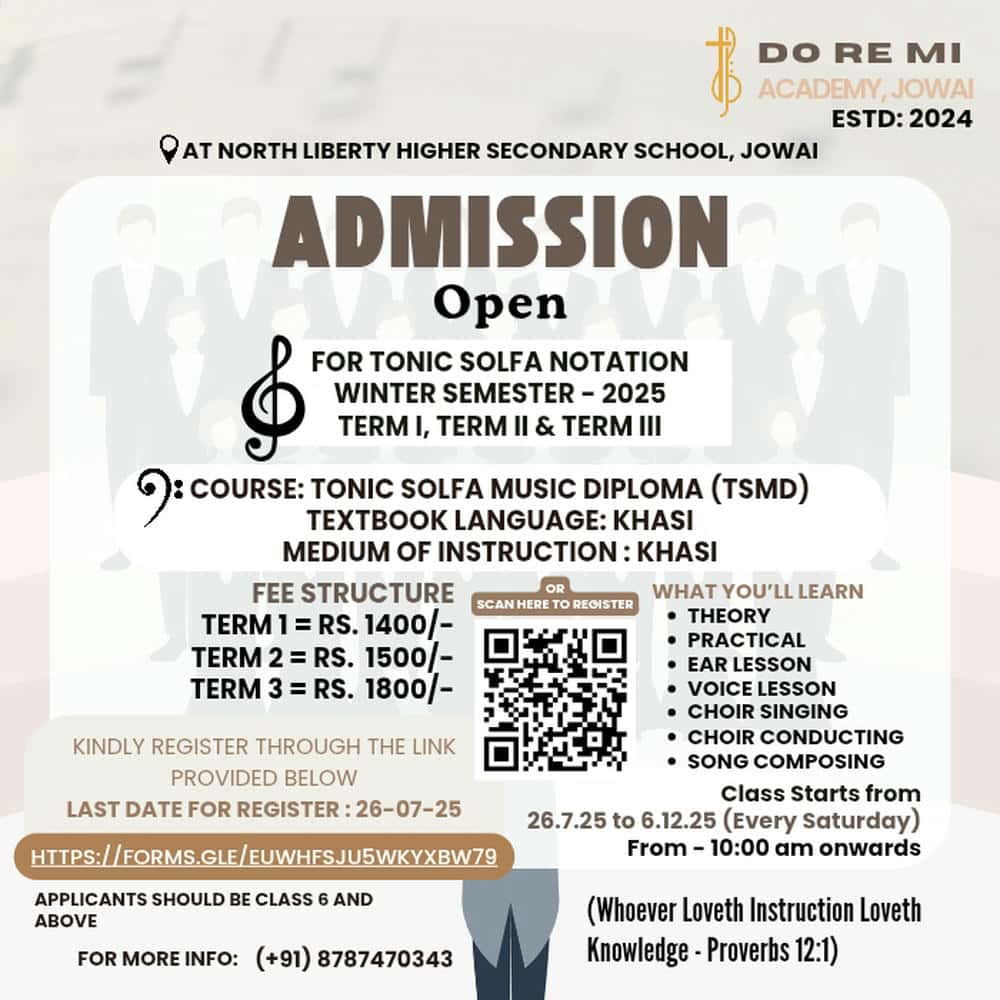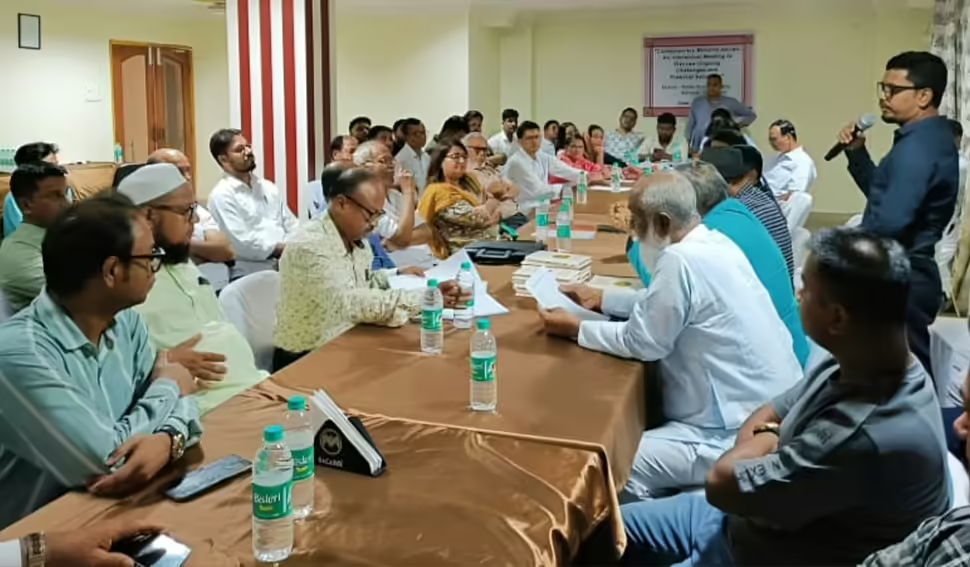Follow ‘Raj dharma’: Muslim intellectuals urge Assam CM

In light of rising communal tensions in Assam, a group of progressive intellectuals, community leaders, and scholars from the religious minority community convened in Six Mile in Guwahati on the night of September 18. The gathering expressed deep concerns about the Assam government’s approach to handling sensitive issues, with particular criticism directed towards Chief Minister Himanta Biswa Sarma and other officials.
The speakers accused the government of exacerbating communal divisions through provocative statements made both within and outside the Assam Legislative Assembly.
The group stressed the need for peace and harmony, urging for a coordinated and collaborative effort between the minority and majority communities in Assam to counter growing tensions. They emphasized the importance of unity and dialogue, calling for steps to prevent further escalation of conflicts and preserve Assam’s social fabric.
The meeting served as a platform to voice worries over the government’s role in fostering divisions and to advocate for a more inclusive and peaceful approach to governance in the state.
At the meeting, the intellectuals expressed strong disapproval of Assam Chief Minister Himanta Biswa Sarma and other officials, accusing them of undermining the constitutional order and promoting division and conflict. They emphasized that, as elected leaders sworn to uphold the Constitution, their actions should be focused on maintaining unity and safeguarding the rights of all communities, rather than fostering communal tensions.
The gathering called for urgent steps to mitigate the potential negative consequences of these divisions and stressed the importance of cooperation between minority and majority communities. They highlighted the need to address social evils collectively, as a means to enhance communal harmony in Assam. One of the key outcomes of the meeting was a proposal for a mass awareness campaign aimed at addressing superstitions and criminal tendencies, particularly in minority areas. This initiative was seen as essential to fostering peace, improving social cohesion, and ensuring long-term harmony across the state.
The group voiced their concern over recent incidents of communal unrest in Assam, particularly highlighting the rise of the “Anti Miya rhetoric” in the upper Assam districts. They emphasized that this rhetoric has contributed to making the state increasingly communally sensitive, exacerbating tensions between different communities. One example they cited was the recent controversy involving fish traders in Nagaon, where traders threatened to stop supplying fish to upper Assam, further intensifying the situation.
The gathering attributed these developments to provocative statements from both ruling party leaders and opposition figures, which they believe have played a significant role in aggravating communal tensions. They expressed alarm at how these remarks have polarized the state’s population, threatening peace and social stability. In response, the intellectuals called for concrete actions to promote peace, harmony, and unity, urging leaders from all sides to act responsibly and refrain from making divisive comments.
They reiterated the importance of fostering understanding between communities to maintain the social fabric of Assam and prevent further unrest.
The meeting was attended by several prominent figures including advocates Hafiz Rashid Ahmed Chowdhury, Maizuddin Mahmood, and Kabel Sikdar, former professor Abdul Mannan, ex-judge Anisur Alam, former Assam Civil Service officer Syed Rafik Ali, and political figures like Mehdi Alom Bora, Mohsin Khan (Congress), Ziaur Rahman (Assam Jatiya Parishad), and Azizur Rahman (Raijor Dol), was a platform to address the growing communal tensions in Assam.
Participants also included writer Dr Rezaul Karim, Abdul Wadud Sheikh, and journalists Afrida Hussain and Dilwar Mazumdar, among others.
During the meeting, the participants unanimously acknowledged that while issues such as superstition and crime exist in certain minority communities due to a lack of education, it was dangerous and unfair for the ruling political party to generalize and vilify the entire Muslim community.
They condemned this agenda, labelling it as divisive and harmful to Assam’s social harmony. The intellectuals also criticized opposition figures, accusing some of collaborating with the ruling party or using communal tensions for political gain, positioning themselves as self-proclaimed defenders of the Muslim community, but contributing to the unrest.
The intellectuals emphasized the need to resist divisive tactics employed by both ruling and opposition parties. They urged everyone to focus on preserving Assam’s long-standing tradition of peace and harmony, cautioning against falling prey to political manoeuvres that could further deepen communal divides.
After nearly four hours of deliberation, the group adopted five key resolutions aimed at fostering unity and addressing the rising communal tensions.
The meeting resolved to raise educational standards in minority communities to combat superstition and crime, a mass awareness campaign to promote peace, tolerance, and understanding among all communities, a united stand against inflammatory statements from both ruling and opposition leaders that exacerbate communal divides, a call for increased dialogue and cooperation between majority and minority communities to preserve Assam’s cultural and social cohesion and vigilance in holding the government accountable for any actions or policies that contribute to communal tensions.
The first resolution called for concerted efforts across all castes, religions, and races to preserve Assam’s peace and harmony. The second condemned divisive rhetoric and warned against actions that could harm social cohesion. The third resolution involved meeting leaders of ethnic, cultural, and literary organizations, as well as the media and political parties, to inform them of the public’s concerns. The fourth resolution called for a meeting with the Chief Minister to urge the observance of constitutional duties, i.e. Rajdharma, as well as a memorandum to the Director General of Police for proper and unbiased enforcement of the law, and the Governor to brief him on the situation. The fifth and final resolution called for awareness campaigns in collaboration with religious institutions such as mosques and madrasas, particularly in areas with high crime rates, to combat superstition and criminal activities.
The group also resolved to seek national support by meeting with political leaders like BRS leader Chandrababu Naidu and JD(U) leader Nitish Kumar. They aimed to brief them on the growing communal tensions in Assam and seek their backing in efforts to restore peace and resolve the situation.


Leave a Reply